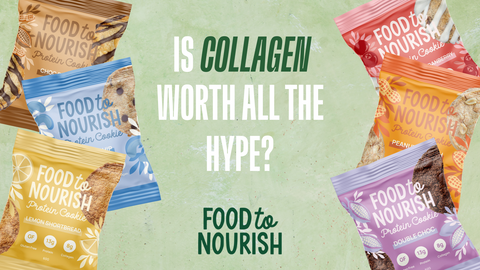Did you know that it is estimated that over 1 million Australians are living with an undiagnosed thyroid disorder? In light of May being Thyroid Awareness Month, in this month's blog our resident dietitian Nicky unpacks what our thyroid gland is, why it is so important when it comes to our health and what to eat if you have been diagnosed with an underactive thyroid.
What is the Thyroid Gland?
The thyroid gland is a soft, butterfly-shaped gland, located in the front of the neck. It uses iodine to produce thyroid hormones (T3 and T4) which are chemical messengers that are involved in lots of processes such as regulating your body temperature, heart rate, reproductive hormones and blood pressure as well as your weight and digestive function. Every single cell in your body needs thyroid hormones in order to function and do its job. Because of this, when things go haywire with your thyroid disease it can be very disruptive to your health.
When things go wrong with the Thyroid Gland
Two main problems can occur with the thyroid gland: too much thyroid hormone (hyperthyroidism) or too little (hypothyroidism). Because hypothyroidism or an underactive thyroid is more common we will focus on this condition.
What is hypothyroidism?
Hypothyroidism (underactive thyroid) occurs when not enough thyroid hormone is being produced. It affects 10 times more women than men and usually it's progressive with symptoms becoming more obvious as your thyroid becomes more sluggish. One of the most common causes is an autoimmune condition called Hashimoto’s Thyroiditis where the body attacks the thyroid gland. Signs of an underactive thyroid include an increased sensitivity to cold, fatigue, weight gain, headaches, joint and muscle pain, heavy or irregular menstrual cycles, constipation, depression, brittle nails and hair and poor memory.
What nutrients are important for thyroid health?
Iodine
Remember that the thyroid gland uses iodine from our diet to produce our thyroid hormones. Iodine is one of the most common nutrient deficiencies and is estimated to affect 35–45% of the world's population. The average iodine intake in Australia also appears to be low. The reason table salt is “iodised” is to help people avoid developing thyroid disease. The average adult needs 150 micrograms of iodine per day. Our main dietary sources are:
- Iodised salt
- Bread made with iodised salt (organic breads and gluten-free breads often are not)
- Seafood including canned salmon and oysters
- Seaweed
- Eggs
- Prunes
Selenium
Selenium is an essential mineral mostly found in thyroid tissue and it is also important for our thyroid hormones. Studies have shown that being deficient may be linked to thyroid disease. Adults need between 60-70 micrograms per day. Brazil nuts are the richest natural source of selenium, but they can increase the risk for selenium toxicity if eaten regularly or in excess. One to two Brazil nuts is sufficient to meet your daily requirements. Other sources include seafood including tuna and prawns, chicken, turkey, pork, cottage cheese, eggs and brown rice.
Iron
An important mineral for many systems in the body, iron is critical for proper thyroid function. Iron deficiency is the most common nutrient deficiency worldwide and is estimated to affect 12% of women, 8% of pre-school-aged children, and 20% of people over 85 years. Red meat such as lamb, kangaroo and beef are the best sources followed by chicken, pork, eggs, seafood, sardines, legumes, tofu, wholemeal pasta, nuts and seeds and iron-fortified foods such as weet-bix. To make sure iron is being absorbed eat foods high in vitamin C with foods that contain iron. This includes oranges or orange juice, broccoli, red capsicum and leafy greens. Cook plant foods to increase the amount of available iron. Avoid having tea, coffee or calcium supplements with meals containing iron.
If you have been diagnosed with a thyroid disorder be sure to book in with one of our qualified Eatsense dietitians today.


